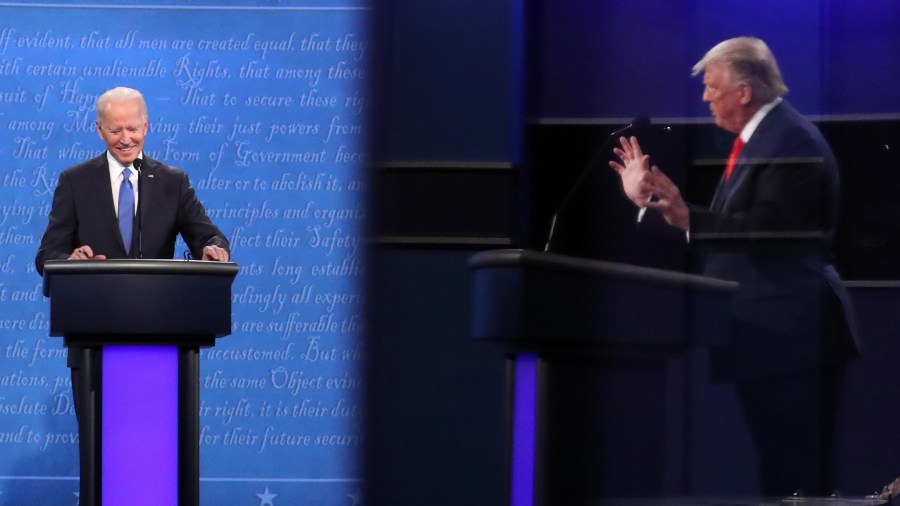Online campaign ads are showing up in more places than ever

Election Day won’t mean the end of campaign ads, of course, but the volume and frequency should go way, way down after today, we hope. And you have no doubt encountered dozens, maybe hundreds in recent weeks. A lot of them online. Starting this past weekend, for example, the Trump campaign has completely taken over the YouTube homepage.
But it’s not just Google and Facebook raking in political ad dollars. A combination of bans on political advertising and a simple lack of digital inventory mean political ads are showing up way more often in places like Roku, Hulu, PlayStation and Pandora. I spoke with Tim Lim, a political advertising consultant who works with Democrats. The following is an edited transcript of our conversation.

Tim Lim: Most of the platforms at this point who are accepting political advertising have done political advertising in the past. There’s some newcomers who maybe they did a little bit, but this is their kind of big presidential year where they’re taking in more ad inventory than usual. One of those that I would highlight is Snapchat. I think Snapchat is going to have a huge year in terms of political advertising that they haven’t seen before.
Molly Wood: With advertising spreading to these new platforms, is it primarily about inventory, or is it also about campaigns just being flushed with cash and wanting to reach potentially even new voters anywhere they are?
Lim: You always want to be able to match where the audience is spending their time on. I think for Democratic campaigns and progressive campaigns, we are focused on turning out young people a lot more. And young people’s media consumption just changes wildly. This cycle, you saw the Biden campaign spend a lot of time and resources into Fortnite and to Animal Crossing, well, that’s because they’re matching the platform of the audience that they’re trying to reach, and that’s going to keep continuing as cycles progress. It is about making sure that you’re vigilant and watching it and being able to advertise on those places where the audience is spending the time.
Wood: Tell me about how inventory works, because on the one hand, we’re talking about a ban, let’s say from Google, that’s squeezing inventory. But generally, this digital advertising space, it seems like it should be infinite.
Lim: The answer is yes and no. There is an infinite amount of ad inventory, yes. [Where] you start to feel the crunch, and where you can actually run out of inventory, is for specific audiences, specific content, specific level of viewability or owned and operated inventory. When you’re advertising, you’re trying to go after specific audiences, and those specific audiences can get booked up and reserve so quickly, so fast, and there’s that fight for that specific audience.
Wood: So we can assume that in the future, YouTube ads targeting women in Ohio are still going to get snapped up pretty early?
Lim: Yeah, unless they ban political advertising. It will still be a hotly contested inventory source in 2022 and 2024.

Related links: More insight from Molly Wood
One other thing Tim Lim mentioned is that part of the reason campaigns are placing ads in unconventional places is that they have a lot of money to spend because fundraising has been huge in the last few months. Particularly on the Democratic side through online fundraising platforms like ActBlue, which Politico reported Friday has transformed how political campaigns worked in this election and how they might work in the future, because apparently nobody ever effectively brought, like, GoFundMe to the campaign party before. The site processed $1.5 billion from July to September distributed to various Democratic candidates.
Overall, the Center for Responsive Politics reports that the 2020 election will cost something like $14 billion, far and away more than any other campaign in history. One “spending flex,” to quote my colleague Kimberly Adams, on a new platform: The Biden campaign built an entire map inside Fortnite, complete with a way-too-buff, kind of disturbingly buff, avatar that may or may not be Joe Biden in military gear and a beret. Which, I mean, look, if I had all the money in the world and the deadline was today, I’d definitely buy myself a super-ripped Fortnite avatar — maybe.
On a more serious note, Bloomberg has a good piece looking at campaign spending on the big two platforms, Facebook and Google, which amounts to hundreds of millions of dollars and has been full of controversy, from fact-checking to banning new election ads but running all the old ones, Facebook accidentally blocking thousands of Biden ads and blocking some Trump ads but allowing others. Twitter, perhaps wisely, just banned all political ads last October, although critics of that move say blocking political ads in their entirety just ends up favoring incumbents.
You know what else Tim Lim suggested in our conversation? Federal rules that would standardize the process across all digital outlets. I know, right? Genius.
The future of this podcast starts with you.
Every day, the “Marketplace Tech” team demystifies the digital economy with stories that explore more than just Big Tech. We’re committed to covering topics that matter to you and the world around us, diving deep into how technology intersects with climate change, inequity, and disinformation.
As part of a nonprofit newsroom, we’re counting on listeners like you to keep this public service paywall-free and available to all.
Support “Marketplace Tech” in any amount today and become a partner in our mission.


















